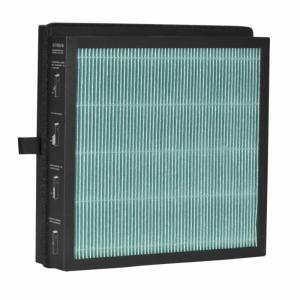

Add to Cart

Replacement Air Sterilizer Hepa H13 Air Filter For Model A1 3 Home Air Purifier
Hepa Air Filter Description
| Product Name | Hepa Air Filter |
| Brand | Customized |
| Color | Blue/Customized |
| Filter Style | Hepa Filter |
| Usage | Air Sterilizer |
| Model | A1 3 |
Hepa Air Filter Quick Details
Q:Is it worth getting a HEPA filter?
A;In short, it depends on what you're trying to accomplish or
alleviate. For people with severe allergies, HEPA filters can help
trap pet dander and other larger allergens. If you're simply
attempting to freshen up your air, then the price tag may not be
worth it. In other words, air purifiers aren't a cure for everyone.
Q:What is the difference between an air purifier and a HEPA air
purifier?
A:Air purifiers use one or more filtration and air treatment
methods to remove pollutants from the air. Air purifiers that use
HEPA filtration can filter air particles down to 0.3 microns in
size with a 99.97% efficiency rating.
Q:What are the two disadvantages of HEPA filters?
A:Won't remove every particle: Unfortunately, HEPA filters will not
remove pollutants from the air that are smaller than 0.3 microns,
including viruses, some bacteria, and volatile organic compounds
(VOCs). VOCs are household items like hairspray and ammonia that
are too small for a HEPA filter to eliminate.
Q:Do HEPA air filters remove coronavirus?
A:When used properly, air cleaners and HVAC filters can help reduce
airborne contaminants including viruses in a building or small
space. By itself, air cleaning or filtration is not enough to
protect people from COVID-19.
Q:What does a HEPA air filter do?
A:It is an acronym for "high efficiency particulate air [filter]"
(as officially defined by the U.S. Dept. of Energy). This type of
air filter can theoretically remove at least 99.97% of dust,
pollen, mold, bacteria, and any airborne particles with a size of
0.3 microns (µm).
Q:Do HEPA air purifiers help with Covid?
A:When used properly, air cleaners and HVAC filters can help reduce
airborne contaminants including viruses in a building or small
space. By itself, air cleaning or filtration is not enough to
protect people from COVID-19.
About Hepa Air Filter
HEPA is a type of pleated mechanical air filter. It is an acronym for "high efficiency particulate air [filter]" (as officially defined by the U.S. Dept. of Energy). This type of air filter can theoretically remove at least 99.97% of dust, pollen, mold, bacteria, and any airborne particles with a size of 0.3 microns (µm). The diameter specification of 0.3 microns responds to the worst case; the most penetrating particle size (MPPS). Particles that are larger or smaller are trapped with even higher efficiency. Using the worst case particle size results in the worst case efficiency rating (i.e. 99.97% or better for all particle sizes).
All air cleaners require periodic cleaning and filter replacement to function properly. Follow manufacturer's recommendations on maintenance and replacement.
Ultra-HEPA filters or ULPA filters. These can trap up to 99.999
percent of particles 0.3 microns or smaller.
Electrostatic filters. These trap particles using a small static
charge, which help the particles stick to the filter.
Electrostatic precipitators. These filters use metal plates or
wires to attract particles with an opposite charge. They can often
be washed and reused.
Ionization. These filters rely on a small charge that emit a
magnetic-like attraction to particles in the air. This type of
filtration may release ozone gases and could cause irritation for
people with respiratory diseases.
About Carbon Air Filter
Activated carbon filters are small pieces of carbon, typically in
granular or powdered block form, that have been treated to be
extremely porous. It is so cavernous, in fact, that just one gram
of activated carbon can easily have a surface area of 500m2 or
higher. Vast surface area enables these carbon filters to adsorb
exponentially more contaminants and allergens than traditional
carbon.
Adsorption is a distinct process where organic compounds in the air
or water react chemically with the activated carbon, which causes
them to stick to the filter. The more porous the activated carbon
is, the more contaminants it will capture. These filters are most
notably used to remove hazardous compounds in home air purification
systems.
Q:What does a carbon filter do?
A:Carbon filters trap odors through a process called adsorption,
which occurs when molecules attach to the outside of a surface,
rather than being soaked into it.
Q:What does carbon filtration remove?
A:Carbon filters can effectively remove or reduce many contaminants
from water including VOCs, chlorine, lead, fluoride, pesticides and
much more.
Q:Which is better charcoal or carbon filter?
A:As a rule, activated carbon is purer and of a better quality than
activated charcoal. Activated charcoal can be useful as a filter,
and it is certainly greatly preferable to not filtering water at
all.
